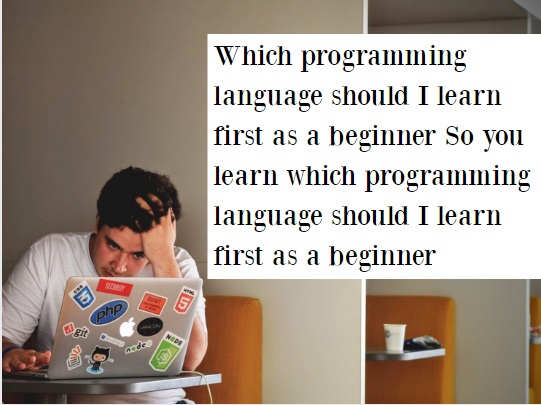Which programming language should I learn first as a beginner?
 |
| Which programming language should I learn first as a beginner? |
Society demands knowledge in programming, which has increased the interest in learning these skills. But which programming language is better to start with? is a unique learning experience for developers to understand what the opportunities are for new tools, programming languages , and platforms. Which programming language should I learn first as a beginner is a hard question.
With the technological invasion that society has suffered - and continues to suffer in some areas - programming is positioned as an essential subject for the execution of the professions of the future. For this reason, in fact, more and more schools and training centers are promoting the teaching of this subject among their students. So Which programming language should I learn first as a beginner.
But at the beginning of that journey in programming, the most frequently asked question is: which language is better to get into it? With a simple Google search, anyone can find information talking about C, C ++, Java, Python, Swift, etc. They are all different programming languages, and each of them has different characteristics and a different approach. The answer to the question which programming language is better? it's pretty simple: it depends on what you want to do.
Choosing one programming language or another depends on what you want to do, although there are a number of languages that are more recommended than others.
Developing an application for an iPhone is not the same as doing it for Android. Nor is it the same to work on an application for mobile phones than to develop a video game for Xbox or to work on all the software that manages the various aspects of a server.
However, programming schools and universities do use certain languages to implement in the minds of students certain logical and structural skills that allow them to better interpret the way in which computers and programming work. One of those languages is C, considered by many to be the “grandfather” of programming languages.
 |
| Which programming language should I learn first as a beginner? |
With C you learn all the basics of programming while going deeper than in other languages in aspects such as memory management (pointers, freeing up memory, etc.) or debugging the code. Likewise, it is a non-object-oriented language, so it serves to develop the structural and sequential thinking that is so important in programming.
Learning C in the first place lays a solid foundation that enhances programming skills and makes it easier to learn other programming languages in the future. However, its complexity makes the learning curve, for someone who does not know to program, is greater than in other languages.
With C you learn the fundamentals of programming and get a broader vision of this subject, but its difficulty is greater than that of other languages such as Java or Python.
That is why many schools turn to Java, one of the most used - and hated by many - programming languages in the world. Unlike C, Java is object-oriented and simplifies many aspects of C, making it more beginner-friendly.
Also, read this article Is SQL a programming language?
This language is considered a higher level language - not to confuse high level with greater difficulty or greater value -, moving away from aspects such as memory management or hardware control, something that C does allow programmers to do. This has its benefits and its disadvantages: the language is friendlier to the beginning programmer but you get a less complete view of what happens behind the scenes when you run a program or alter a piece of code.
A third language highly recommended for beginners is Python, simpler and more friendly than the previous two. Furthermore, it requires less precision in its syntax, eliminating the possibility of absurd mistakes by beginners. Companies like Instagram, in fact, use this language in some parts of their product, and its popularity has increased in recent years. The problem is, as with Java, the breadth of vision it provides.
The best way to build a solid foundation is to learn C and then start with higher-level languages like Java or Python, which are in high demand. In addition, being based on each other, a person who already knows the C language will find it very easy to learn and interpret other languages such as C ++, Java, or Python. Part of the syntax or methodologies are shared between languages, so the simplicity of learning is exponentially reduced. Which programming language should I learn first as a beginner? Hope you understand the concepts.












No comments
Note: Only a member of this blog may post a comment.